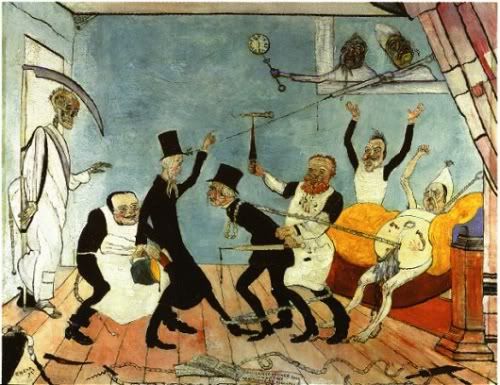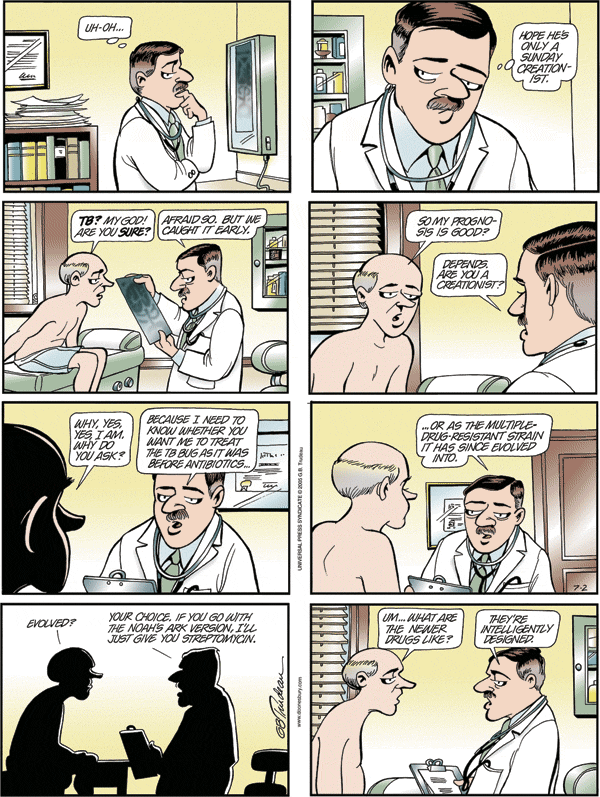Doctors Are Just Special

The Bad Doctors
This past week hasn't been a good one for the medical profession. I won't even get into the doctor and nurses in New Orleans, that's something that's more likely than not going to wind up before a jury to try and get the facts and particulars straightened out. The issues that jumped out to me were more longstanding ones, and are ones where doctors seem to hold themselves up as above considerations that the rest of us have to make. Somehow I had the sense that there are too many doctors out there who think they're just plain special.
First issue, published in the Times, Report Finds a Heavy Toll From Medication Errors, informs us:
"Medication errors harm 1.5 million people and kill several thousand each year in the United States, costing the nation at least $3.5 billion annually, the Institute of Medicine concluded in a report released on Thursday. Drug errors are so widespread that hospital patients should expect to suffer one every day they remain hospitalized, although error rates vary by hospital
and most do not lead to injury, the report concluded."
Well, while 1.5 million errors a year may occur most don't lead to injury - I'm sure we can all take comfort from that. Now why does this situation exist? Because the medical profession has done a totally piss poor job in digitizing prescriptions. It's not just a matter of being able to write out more legible prescriptions, a problem many make a joke of in spite of the fact that this, too, leads to injury and possible death, but that with digitized systems errors in dosage or potential drug interaction problems may be caught by an intelligent system - we're not talking Einsteinian intelligence mind you, we're talking the sort of "intelligence" that's well within the capability of systems that have existed for ten years or so now. FedEx can track your package to the point where you know when it's been put in a truck in some city in Turkey, but we can't digitize hospitals and standard medical administrative systems. Yes, there's more to it in medicine than FedEx requires, but not so much more that there's any reasonable excuse why it hasn't happened to date.
Next we have, again from the Times, Journal Editor Again Says She Was Misled. In the last two months there have been three occasions where the editor of the Journal of the American Medical Association has discovered that authors publishing in the journal wrote papers regarding topics that the doctors in question had been paid by pharmaceutical companies to do research on. No one would automatically impugn a doctor's ethics because he/she published such a paper - well, really, no one would were the doctors in question thinking that normal ethical considerations that seem to apply to everyone else also apply to them and they in fact identified the association in their paper. I don't know how many times I've seen journalists writing about something to which they had a connection. For example, the journalist identifies that he/she indirectly, or sometimes directly, work for a parent company which the reporter was writing directly or indirectly about and this association would not have been immediately obvious to the average reader. It makes perfect ethical sense to put out into the open that what you write about, be it a paper or an article, any association you may have that may cause people to think that what you're writing may be in someway swayed by this association. Journalists can figure this out, doctors can't - why?
The last one really got my head spinning, not least of all because the psychiatrist in question has obtained a public defender because he has convinced the courts that he can't afford to hire his own lawyer. Mind you, this doctor admits that last year he made about $100,000 just for endorsing a drug called Xyrem. Well, that's besides the point, this doctor, Dr. Gleason, was arrested by the FDA for stretching the line regarding Xyrem, specifically with regard to something called "off-label" prescriptions. Off-label prescriptions are when a drug is prescribed for something that it wasn't originally intended for. Drug X was designed to combat depression, for example, but it's also discovered that it clears up acne. The drug is only approved by the FDA for use against depression, but nothing stops a doctor from putting together an "off-label" prescription to help some teenager with the angst of Acne.
So off-label prescribing is legal, but it's illegal for a company to advocate any off-label uses for its drugs. The company in this case (the company in question didn't invent this, be sure, and some variation of this is common practice in medicine) was getting around it by essentially hiring Gleason to give "talks", for which he could make up to $3000 a day, to fellow doctors, in their office, at professional meetings, at medical schools, etc. So Gleason was a paid shill for a drug company, and he, and many of his fellow physicians, don't see any problem with this. Why? Because they believe in these drugs. Ok, great, but of course they have no scientific evidence, certainly Gleason didn't (though he did at one point tell investigators differently), to support their experiential/anecdotal experiences with these drugs. As it stands any doctor can come up with a ridiculous theory as to how a particular drug could be used to cure a problem in spite of the fact there's zero evidence to support the claim in question. A good example of this is testosterone being administered to men of a certain age. While testosterone will make a man in his 50's feel like he's 25 again, there's no scientific evidence to support what a normal level of testosterone is in any man, or what administering testosterone to men in their 50's will do to them; that, though, doesn't stop doctors who can make a lot of money from administering those testosterone shots.
The hubris of Gleason, who was willing to be a paid talking hand puppet for a drug company and didn't see a problem with it, is shared by the many in the medical profession. It seems that in the medical profession that it's ok if fellow doctors are paid shills for drug companies, doctors somehow know better and aren't swayed by this, or at least so they seem to say. Or somehow they're entitled to the money because ... well, whatever, there's rationalization there,
I'm sure.
Now I see the value of off-label prescriptions, but not with paid-representatives of drug companies, who may not work directly for these companies, being able to pitch those drugs to their fellow doctors. If you're getting the word out for free, fine, and it'd be really nice if the medical profession would on some level police the whole off-label practice, maybe with some sort of minimal review process so that any ties between the interest of big or little pharma and those of patients are kept in appropriate perspective. Something else that doctors need to keep in mind: they're not trained scientists. Just because someone has "M.D." tacked next to their name doesn't make him/her a person of science. Yes, they've some measure of scientific training, but it's minimal compared to PhD's, and the vast majority of doctors don't have the training to function as "scientists", but yet they're making drug usage determinations based on ... well, really, personal experience, which in science doesn't add up to a whole heck of a lot.











